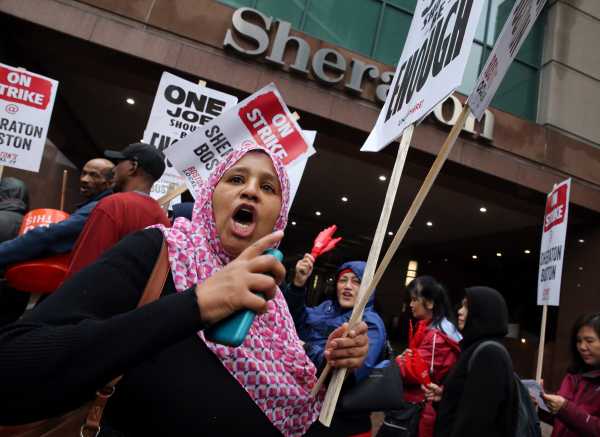
Thousands of Marriott workers are going back to work Wednesday after ending the largest hotel strike in US history.
About 2,500 striking hotel workers in San Francisco ratified a new contract with the hotel chain on Monday after months of tense negotiations, according to their labor union Unite Here. It was the final deal reached during a two-month strike that spread to 23 Marriott hotels in eight cities.
The new union contracts vary by city, but in San Francisco, housekeepers will get a $4 hourly raise over the next four years. Right now, their median hourly wage is $23 an hour, according to the New York Times. Retiring employees will also get a small pension based on how many years they’ve worked at the company.
As part of all new contracts, Marriott will provide GPS-enabled panic buttons for housekeepers to alert security staff if they feel unsafe with a guest when cleaning a room. And for the first time, the company has agreed to ban guests who have a history of sexually harassing workers.
The new contracts end months of loud, heated protests outside some of America’s most iconic Marriott-owned hotels. Nearly 8,000 housekeepers, bartenders, and other service workers walked off the job at two dozen hotels in Detroit, Boston, San Diego, San Jose, Oakland, San Francisco, Maui, and Oahu, according to Unite Here, which represents more than 20,000 Marriott workers in the United States and Canada.
As of publication time, Marriott had not responded to a request for comment from Vox.
In recent weeks, union representatives in several cities reached a deal with the world’s largest hotel chain. The contract for workers at San Francisco’s Marriott hotels was the last one. After news broke Monday that a tentative deal was made, workers were euphoric:
The strike spread after negotiations stalled over the summer
Employees grew frustrated with Marriott over the summer, after the labor contracts for about 12,000 Marriott workers started to expire. They were trying to negotiate better contracts to replace the 5-year contracts that were ending, but progress was slow. Workers spent the summer picketing and marching outside some of the country’s most prominent hotels, urging the world’s largest hotel company to give them more money and better benefits.
By September, negotiations with the company had stalled, and workers across the country voted to authorize a strike. On Labor Day, police arrested 75 Marriott employees for blocking a street as they protested outside the Westin St. Francis hotel in San Francisco.
The strikes came at a time when the company was making record earnings. In recent years, Marriott International has grown into one of the largest and most profitable hotel chains in the world. After buying Starwood Hotels in 2016, the company now runs more than 6,500 properties, including the Ritz-Carlton, Sheraton, and Renaissance Hotels. The company is valued at about $49.4 billion, nearly double the value of Hilton, according to Forbes, and made $3.2 billion in profits in 2017 alone.
The hotel chain’s workers want a larger share of that revenue. They argue that servers’ and housekeepers’ low wages (which vary by city) make it impossible to live in some of the nation’s most expensive cities. They’re also asking the company to ease strenuous workloads that often lead to injuries, and for more protection against sexual harassment and violence.
Housekeepers and room service staff are particularly vulnerable to sexual harassment when they enter guest rooms alone, and the union requested hotels provide them with panic buttons that allow workers to immediately alert security staff when they feel threatened.
As workers went on strike across the country, they urged businesses and hotel guests to cancel their reservations at the hotels. Some groups, including the Shanti Project, the Chicana Latina Foundation and the Communications Network, moved events they planned to host at Marriott hotels to other locations.
To stay open for business, Marriott had to bus in temporary workers from hours away. The company told investors during its quarterly earnings call in November that the strikes would not affect Marriott’s bottom line.
Workers want to benefit from the growing economy
The last time most Marriott workers negotiated a labor contract was five years ago, when the economy was still struggling to emerge from the Great Recession. Things are different now: Marriott is by far the largest hotel chain in the world in revenue, and the company had some of its highest profits last year. That doesn’t even count the windfall the company is getting this year from the Republican corporate tax cuts.
The labor union said that aside from asking for a raise, hotel workers want a certain number of guaranteed work hours, more secure schedules, better sexual harassment protections, and pregnancy accommodations. It’s unclear if they got everything they asked for, but the company did make concessions to improve scheduling and strengthen its sexual harassment
Unite Here Local 26, which represents Boston’s Marriott workers, says employees were also concerned about how technology will disrupt their careers. Many hotels are considering self-check-in kiosks and robot room-service delivery, according to the Boston Globe.
The new contracts include a plan to bring union and hotel representatives together to discuss the impact of automation on employees.
Unite Here considers these new contracts “historic” for the leisure and hospitality industry.
“[This] marks the beginning of a new standard for hotel workers in North America, and has made Marriott a leader in the hospitality industry by ensuring that one job is enough for hotel workers to live with dignity,” said D. Taylor, president of Unite Here, in a statement released Monday, right before workers in San Francisco voted to ratify the contract.
Here’s a video of the workers after 99.6 percent of them voted for the deal Monday evening:
Sourse: vox.com






